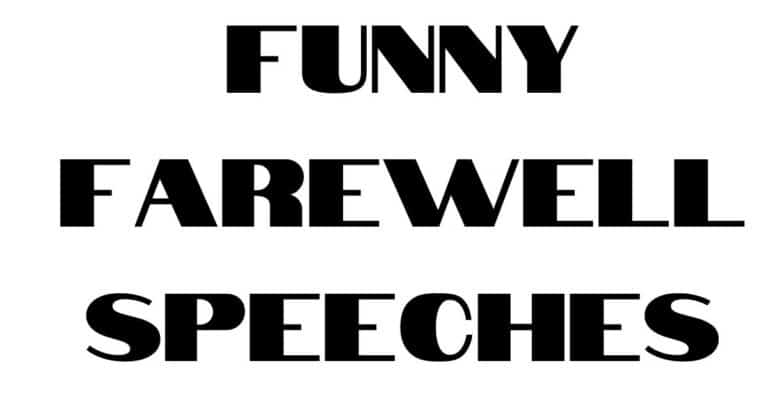One of the Funniest Indian Jokes
A Japanese tourist hailed a taxi in downtown Delhi and asked to be taken to the Indira Gandhi airport.
On the way, a car zoomed by, and the tourist responded, ‘Oh! Toyota – Made in Japan! Very fast!’
Not too long afterward, another car flew by the taxi. ‘Oh! Nissan – Made in Japan! Very fast!’ Then yet another car zipped by, and the tourist said, ‘Oh! Mitsubishi – Made in Japan! Very fast!’
The taxi driver, who was 100% Indian, was starting to get a little annoyed that the Japanese-made cars were passing his taxi when yet another car passed the taxi as they were turning into the airport. ‘Oh! Honda – Made in Japan! Very fast!’
The taxi driver stopped the car, pointed to the meter, and said, ‘That’ll be Rupees 500.’ ‘Rupees 500? It was a short ride! Why so much?’
The Taxi driver smiled as he replied, ‘Meter – Made in India. Very fast.’
Advice from Delhi
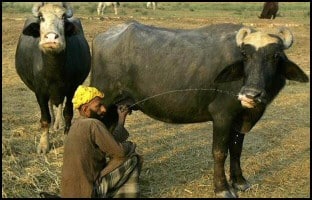
A herder feeds a buffalo its own milk before milking it on the outskirts of Amritsar, India. See more Indian True Stories.
Funny Examples of Inglish or Indian English Humour
- Sri Lankans may say: I am liking it very much. Instead of saying: I like it very much.
- They might say: She performs many charities. Instead of: She gives away a lot to charity.
- They might say: My all closets are empty. Instead of: My closets are all empty.
- A question: ‘Didn’t you take Rita to school?’ May be answered with: Yes, I didn’t. Instead of: No, I didn’t.
- They might say: Let’s go out for some ice-cream-vice-cream. They mean: Let us go out for some ice cream.
- They might say: What is your good name? Instead of: What is your name?
- Will’s Mother, who is from Sri Lanka used to say such things as: They did it, no? / He is here, isn’t it?/ She closed the door, did she? Instead of: They did it, didn’t they? / He is here, isn’t he?/ She closed the door, didn’t she?
- Compiled by Will with the help of Dr Roopa Nishi Viswanathan
Amusing Inglish Pictures
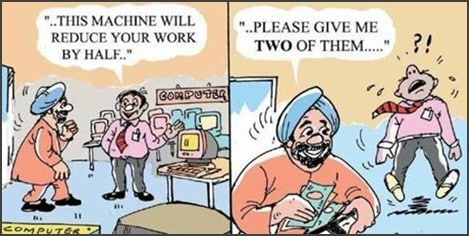
Classic Indian Humour
How Can You Be Sure Someone Is A Sardar?
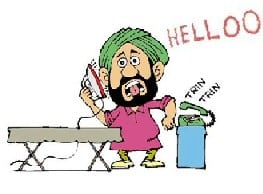
- They send a fax with a postage stamp on it.
- He tries to drown a fish in the water.
- Trips over a cordless phone.
- Thinks socialism means partying.
- Studies for a blood test and fails.
- Gets stabbed in a shoot-out.
- Puts lipstick on his forehead because he wants to make up his mind.
- Takes a ruler to bed to see how long he slept.
- At the bottom of the application form where it says: “Sign Here”, he puts ‘Scorpio’.
- Sells the car for gas money.
- Misses the 44 bus, and takes the 22 twice instead.
- Drives to the airport and sees a sign that says, “Airport left”, he turns around and goes home.
- Gets locked in the Furniture Shop and sleeps on the floor.
Indian Words Adopted by the British
50 words from India
A – atoll, avatar
B – bandana, bangle, bazaar, Blighty, bungalow
C – cashmere, catamaran, char, cheroot, cheetah, chintz, chit, chokey, chutney, cot, cummerbund, curry
D – dinghy, doolally, dungarees
G – guru, gymkhana
H – hullabaloo
J – jodhpur, jungle, juggernaut, jute
K – khaki, kedgeree
L – loot
N – nirvana
P – pariah, pashmina,
polo, pukka, pundit, purdah, pyjamas
S – sari, shampoo, shawl, swastika
T – teak, thug, toddy, typhoon
V – veranda
Y – yoga
Sources: Hobson-Jobson, Oxford English Dictionary
Unintentional Consequences – The Cobra Effect
Back in the days of India and the British Raj, the deadly cobra was troubling the natives of Delhi. It was decided by the government to throw money at the problem and pay a bounty to the natives for killing the cobras.
At first, all went according to plan, and the number of venomous snakes decreased. But then a group of wily snake charmers, seeing a nice little earner started breeding the cobras and selling them to the British officers.
Well eventually, even the guileless British ruling classes rumbled that the Indian natives were taking them for a ride. The governor withdrew the bounty; whereupon the snake charmers retaliated by releasing the breeding stock of cobras. Thus the unintentional consequence of a bounty to kill the cobras was more of these venomous snakes than ever.
Inglish Jokes, Indian English, | Funny Inlish Pictures
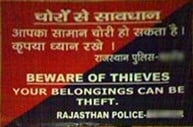
Indian English comprises several dialects of English spoken primarily in the Indian subcontinent. These dialects arose during the colonial rule of Britain in India and provide a rich seam of Inglish jokes.
Will and Guy would like to share with our readers some examples of this “type of English speak.” We do not do this to poke fun at our Indian friends, although some expressions do bring a smile to our lips.
Inglish Heard After an English Exam
Devyani; Hey, I wanted to confirm one of my answers. Can you help
Anil: Sure, which one was it?
Devyani: Well, we were supposed to add a suitable preposition in the blank. The question was, ‘Bear ____ me for a while.’
Naturally, the answer was “Bear with me for a while.” This means that the speaker requests the person to be patient for a while.
Devyani, however, changed the meaning completely with her answer by writing: “Bear chased me for a while.”
Ingrish Heard In the Office
Once, my colleague, Hasan, wanted to inform our Director that his mother was seriously ill and that he needed a few days of leave. His application reads as follows:
Wrong Inglish: My mother is very dangerous and I want to see her. Please leave me three days.
The mother is not dangerous. She’s very ill. Also, he doesn’t want to see her, which sounds gruesome. Instead, he wants to “see her”, or better still, be by her side”. Finally, he is requesting leave; he doesn’t want the boss to actually leave him for three days.
Correct English: My mother is seriously ill and I would like to be by her side. Therefore, I request you grant me leave for three days.
Funny Inglish Jokes
More examples of Inlish or Ingrish which you may hear in India or Sri Lanka.
Wrong: Take this letter and post it yourself.
Correct: Please take this letter and post it yourself.
Wrong: Udupi Hotel’s fooding is not good.
Correct: The food at Udupi Hotel is not good.
Inlish Heard In the Park
Another funny incident happened to Vivendra who was walking in a park with his cousin, Farah.
Vivendra: Wow, what a peaceful atmosphere. It’s so calm.
Farah: Yes, this calamity is very nice.
Calamity refers to a disaster or a tragedy. Farah’s answer meant something completely different to what she meant.
lp of Dr. Roopa Nishi Viswanathan
Inglish Abbreviations
At the other end of the speech spectrum these Inglish, or Ingrish funnies arise from shortening English words.
- Subsi = subsidiary
- Supli = supplementary
- Soopi = superintendent
- Princi = principle
- Gen. Sec. or G. Sec. = General Secretary
- Soc. Sec. = Social Secretary
- Lab ass = laboratory assistant
- Ass wardi = assistant warden
Raj and the Wedding
Raj and Jeeto were preparing wedding cards for their daughter at the printers.
Jeeto was not very good at English so she asked the printer to help her. After the printer had presented her with a draft, she quickly pointed out that the “RSVP ” was missing.
The printer was surprised by Jeeto’s knowledge and asked her if she knew what it meant.
Jeeto started to think and after much thought, he replied, ‘Vait! I remember. I remember – RSVP. It means “Remember, Send Vedding Present.”‘
Amusing Inlish Picture
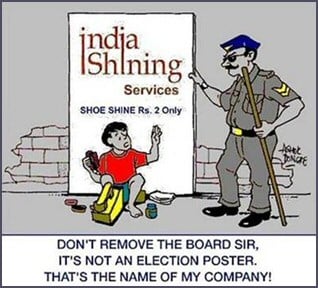
Hilarious and Funny Examples of Indian English Gleaned from Jason Baldridge [UK – Daily Telegraph]

‘Entry From Backside Only’, is a funny Ingrish sign that refers to a phrase commonly used on signposts in India to indicate the rear entrance of a building.
More Inglish Jokes
Dear sir, with reference to your above, see my below – popular opening line in official letters.
- Teachress – a female teacher.
- Timepass – a trivial activity that passes the time.
- She freaked out last night – she had a good time.
- Your lyrical missive has enveloped me in the sweet fragrance of our love – from a book advising lovers on how to write to girlfriends.
- Premesh Patel has left for his heavenly above – a death notice.
- Hue and Cry notice – the title of the police missing person newspaper advertisement.
- Don’t do nuisance in public – government admonition against urinating in public.

Perhaps the most endearing aspect of Indian English is the way it has preserved forms now regarded as highly old-fashioned in Britain. Addresses such as “Good sir” and questions like “May I know your good name?” are commonplace, as are terms like “tiffin” and “cantonment”.
Adding to English Words to Create Inglish
Let us start with Inglish humor by examining the practice in Mumbai of adding -fy to a Hindi word to indicate that an action is being done to someone by someone. From the Hindi word Muska, muskafy means to flatter somebody or to butter them up. Similarly, to pataofy is the action of wooing someone.
Examples of Inglish Acronyms
- MCP = Male Chauvinist Pig
- FOC = Free Of Charge
- MPK = Maine Pyar Kiya (a popular movie)
- QSQT = Qayamat Se Qayamat Tak (a popular movie)
- ILU = I Love You (from a song; pronounced ee-lu)
- ABCD = American Born Confused Deshi (native of India)
- FOB = Fresh Off the Boat
The Origin of Inglish Jokes
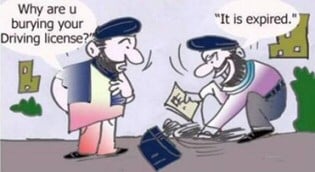
English has been with India since the early 1600s when the East India Company started trading and English missionaries first began their efforts.
The English that is spoken in India is different from that spoken in other regions of the world, and it is regarded as a unique variety which is called Indian English or Inglish.
Indians also shorten many words to create commonly used terms.
Enthusiasm is called enthu; as such, it can be used in new ways. One can say, ‘That guy has a lot of enthu.’ While this is simply an abbreviation, enthu can also be used as an adjective where enthusiasm cannot, as in ‘He’s a real enthu guy.’
The same applies to fundamentals, which is shortened as fundas. ‘She knows her fundas.’ What is interesting about fundas is that when the -as ending is dropped and -u is added, it takes on a new meaning and can be used in a new way. Fundu means wonderful or brilliant. One can say ‘He is a fundu person’ or even ‘He is fundu.’
Sardar Style Ingrish Jokes
- Sardar bought a new mobile. He called everyone in his Phone Book and told them: “My mobile number has changed, earlier it was a Nokia 3310, now it is a 6710”
- Two Sardarjis are looking at an Egyptian mummy. Sardar 1: Look, so many bandages! Must be a Pukka lorr accident case. Sardar 2: Aaho, lorry number is also written…BC 1760!!!
- Sardar Premdeep Singh is sitting his University final examination. He takes his seat in the examination hall, stares at the question paper for five minutes, and then in a fit of inspiration takes his shoes off and throws them out of the window. He then removes his turban and throws it away as well. His shirt, pants, socks, and watch follow suit. The invigilator, alarmed, approaches him and asks what is going on. ‘Oye, I am only following the instructions,’ Premdeep replies, ‘it says here, “Answer the following questions in brief.”‘
Ten Funny Reasons Why English and Inglish are so Difficult
- The bandage was wound around the wound.
- There was a row among the oarsmen about how to row.
- They were too close to the door to close it.
- The buck does funny things when they are present.
- They sent a sewer down to stitch the tear in the sewer line.
- To help with planting, the farmer taught his sow to sow.
- The wind was too strong to wind the sail.
- After a number of Novocain injections, my jaw got number.
- I shed a tear when I saw the tear in my clothes.
- I had to subject the subject to a series of tests.
English and Inglish
English is one of the official languages of India, with about ninety million speakers according to the 1991 Census.
Fewer than a quarter of a million people speak English as their first language. With the exception of some families who communicate primarily in English, as well as members of the relatively small Anglo-Indian community numbering less than half a million, speakers of Indian English use it as a second or third language, after their respective Indian language(s).
Several idiomatic forms, derived from Indian literary and vernacular language, also have made their way into Indian English. Despite this diversity, there is general homogeneity in syntax and vocabulary among the varieties of Indian English.

